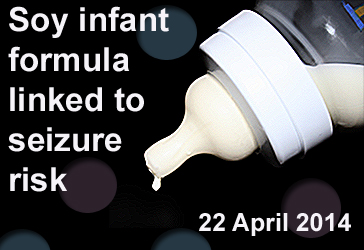Check out other stories from the Latest News
Soy-Based Infant Formula Doubles Risk of Seizures
By Shana R. Spindler, Ph.D. on April 22, 2014

Background: Nearly 25 percent of infant formulas use soy protein, and many families rely on this non-dairy alternative during an infant’s first years of life. Some are concerned, however, that a component in soy called phytoestrogens may have an adverse impact on infants’ health by mimicking hormones in the body. Given the widespread use of soy-based formula, relatively few studies have addressed the effect of phytoestrogens on early childhood development.
What’s new: In 2013, Dr. Cara J. Westmark of the University of Wisconsin, Madison, reported that mice with neurological disease had more seizures while eating a soy-based diet. Now, she has expanded her studies to a human population. In the March 2014 issue of the online journal Plos One, Dr. Westmark reports that children with Autism Spectrum Disorder (ASD) are 2.6 times more likely to have febrile seizures—those associated with a high fever—and 2.1 times more likely to have epilepsy when given a soy-based infant formula. Even though the study was large, including 1,949 children, caution should be taken before making firm conclusions. The formula and seizure data were based on parental recall, and the study did not take into account the reasons for using soy formula nor the length of time on it.
Why it’s important: This study highlights the need to further investigate an association between phytoestrogen exposure early in life and an increased risk of seizures in the ASD population. The ability to decrease seizure risk through diet modification alone would be an important finding for those with ASD.
Help me understand :
| Source(s) : |
| Tweet |

